By Purity Mukami, John-Allan Namu, and Kira Zalan
Two obscure companies linked to Kitui South MP Rachael Kaki Nyamai were paid at least KSh 24.2 million to deliver medical supplies under single-source agreements at the time the MP was chair of the National Assembly’s Health Committee, an investigation by Africa Uncensored and The Elephant has uncovered.
One of the companies was also awarded a mysterious Ksh 4.3 billion agreement to supply 8 million bottles of hand sanitizer, according to the government’s procurement system.
The contracts were awarded in 2015 as authorities moved to contain the threat from the Ebola outbreak that was ravaging West Africa and threatening to spread across the continent as well as from flooding related to the El-Nino weather phenomenon.
The investigation found that between 2014 and 2016, the Ministry of Health handed out hundreds of questionable non-compete tenders related to impending disasters, with a total value of KSh 176 billion including three no-bid contracts to two firms, Tira Southshore Holdings Limited and Ameken Minewest Company Limited, linked to Mrs Nyamai, whose committee oversaw the ministry’s funding – a clear conflict of interest.
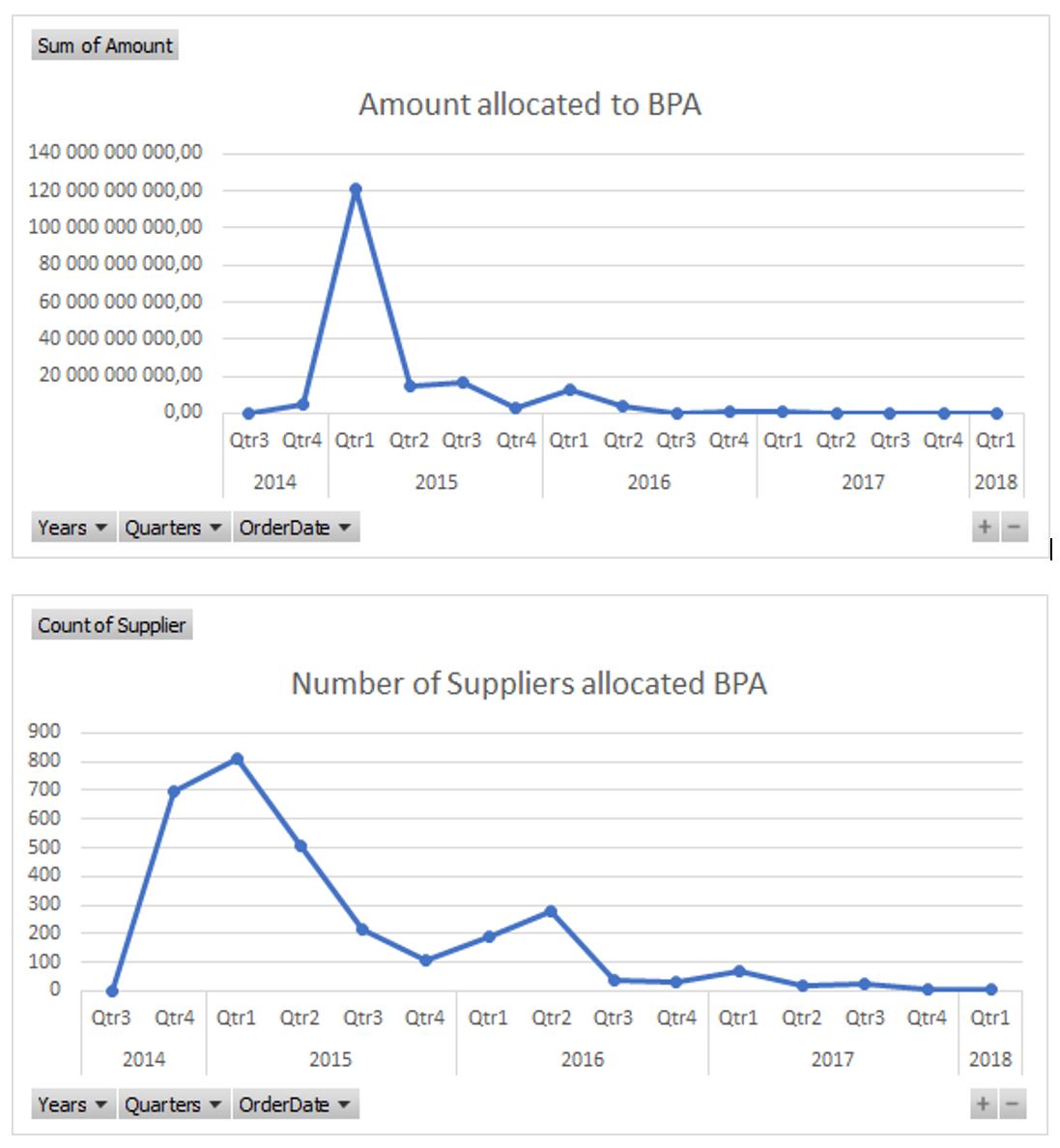
Although authorities have since scrutinized some of the suspicious contracts and misappropriated health funds, the investigation revealed a handful of contracts that were not made public, nor questioned by the health committee.
Mrs Nyamai declined to comment for the story.
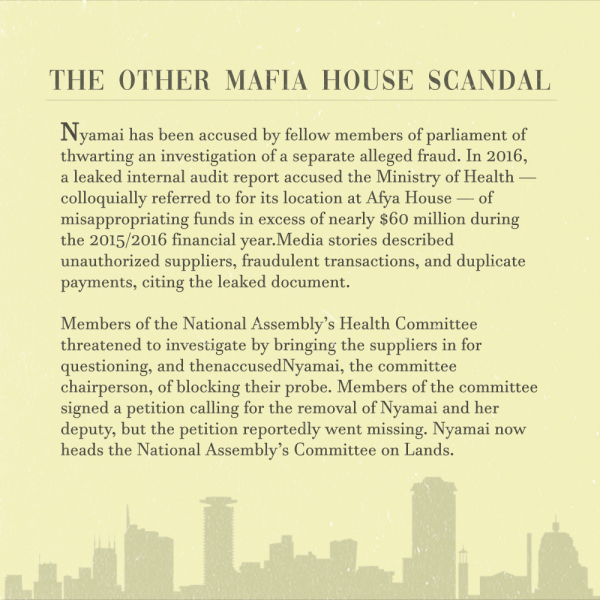
Transactions for companies owned by Mrs Nyamai’s relatives were among 25,727 leaked procurement records reviewed by reporters from Africa Uncensored, Finance Uncovered, The Elephant, and OCCRP. The data includes transactions by eight government agencies between August 2014 and January 2018, and reveals both questionable contracts as well as problems that continue to plague the government’s accounting tool, IFMIS.
The Integrated Financial Management Information System was adopted to improve efficiency and accountability. Instead, it has been used to fast-track corruption.
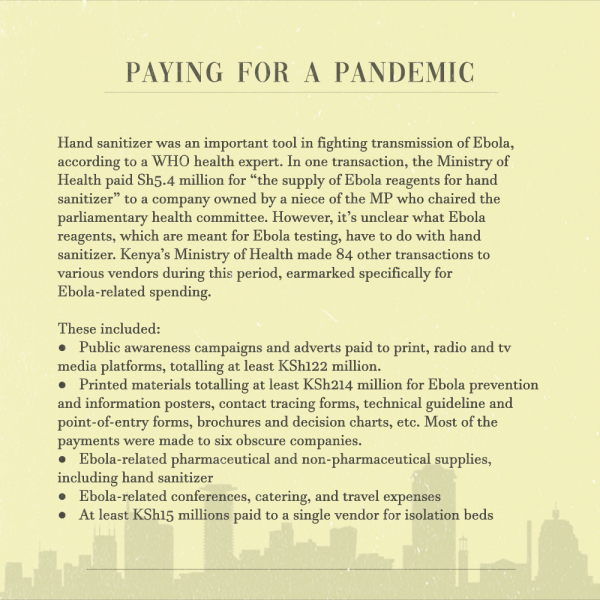
Hacking the System
Tira Southshore Holdings Limited and Ameken Minewest Company Limited, appear to have no history of dealing in hygiene or medical supplies. Yet they were awarded three blanket purchase agreements, which are usually reserved for trusted vendors who provide recurring supplies such as newspapers and tea, or services such as office cleaning.
“A blanket agreement is something which should be exceptional, in my view,” says former Auditor-General, Edward Ouko.
But the leaked data show more than 2,000 such agreements marked as approved by the heads of procurement in various ministries. About KSh 176 billion (about $1.7 billion) was committed under such contracts over 42 months.
“Any other method of procurement, there must be competition. And in this one there is no competition,” explained a procurement officer, who spoke generally about blanket purchase agreements on background. “You have avoided sourcing.”
The Ministry of Health did not respond to detailed questions, while Mrs Nyamai declined to comment on the contracts in question.
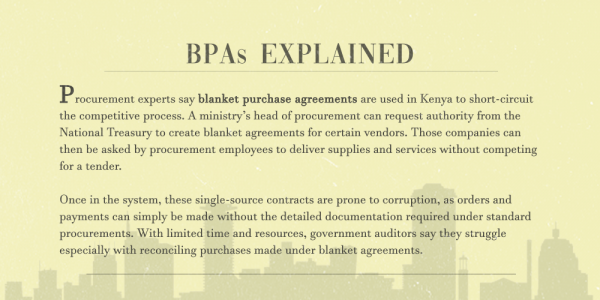
The agreements were almost always followed by standard purchase orders that indicated the same vendor and the same amount which is unusual and raises fears of duplication. Some of these transactions were generated days or weeks after the blanket agreements, many with missing or mismatched explanations. It’s unclear whether any of these actually constituted duplicate payments.
For example, the leaked data show two transactions for Ameken Minewest for Sh6.9 million each — a blanket purchase order for El Nino mitigation supplies and a standard order for the supply of chlorine tablets eight days later. Tira Southshore also had two transactions of Sh12 million each — a blanket purchase for the “supply of lab reagents for cholera,” and six days later a standard order for the supply of chlorine powder.
Auditors say both the amounts and the timing of such payments are suspicious because blanket agreements should be paid in installments.
“It could well be a duplicate, using the same information, to get through the process. Because you make a blanket [agreement], then the intention is to do duplicates, so that it can pass through the cash payee phase several times without delivering more,” said Ouko upon reviewing some of the transactions for Tira Southshore. This weakness makes the IFMIS system prone to abuse, he added.
In addition, a KSh4 billion contract for hand sanitizer between the Health Ministry’s Preventive and Promotive Health Department and Tira Southshore was approved as a blanket purchase agreement in April 2015. The following month, a standard purchase order was generated for the same amount but without a description of services — this transaction is marked in the system as incomplete. A third transaction — this one for 0 shillings — was generated 10 days later by the same procurement employee, using the original order description: “please supply hand sanitizers 5oomls as per contract Moh/dpphs/dsru/008/14-15-MTC/17/14-15(min.no.6).
Reporters were unable to confirm whether KSh4 billion was paid by the ministry. The leaked data doesn’t include payment disbursement details, and the MOH has not responded to requests for information.
“I can assure you there’s no 4 billion, not even 1 billion. Not even 10 million that I have ever done, that has ever gone through Tira’s account, through that bank account,” said the co-owner of the company, Abigael Mukeli. She insisted that Tira Southshore never had a contract to deliver hand sanitizer, but declined to answer specific questions. It is unclear how a company without a contract would appear as a vendor in IFMIS, alongside contract details.
It is possible that payments could end up in bank accounts other than the ones associated with the supplier. That is because IFMIS also allowed for the creation of duplicate suppliers, according to a 2016 audit of the procurement system. That audit found almost 50 cases of duplication of the same vendor.
“Presence of active duplicate supplier master records increases the possibility of potential duplicate payments, misuse of bank account information, [and] reconciliation issues,” the auditors warned.
They also found such blatant security vulnerabilities as ghost and duplicate login IDs, deactivated requirements for password resets, and remote access for some procurement employees.
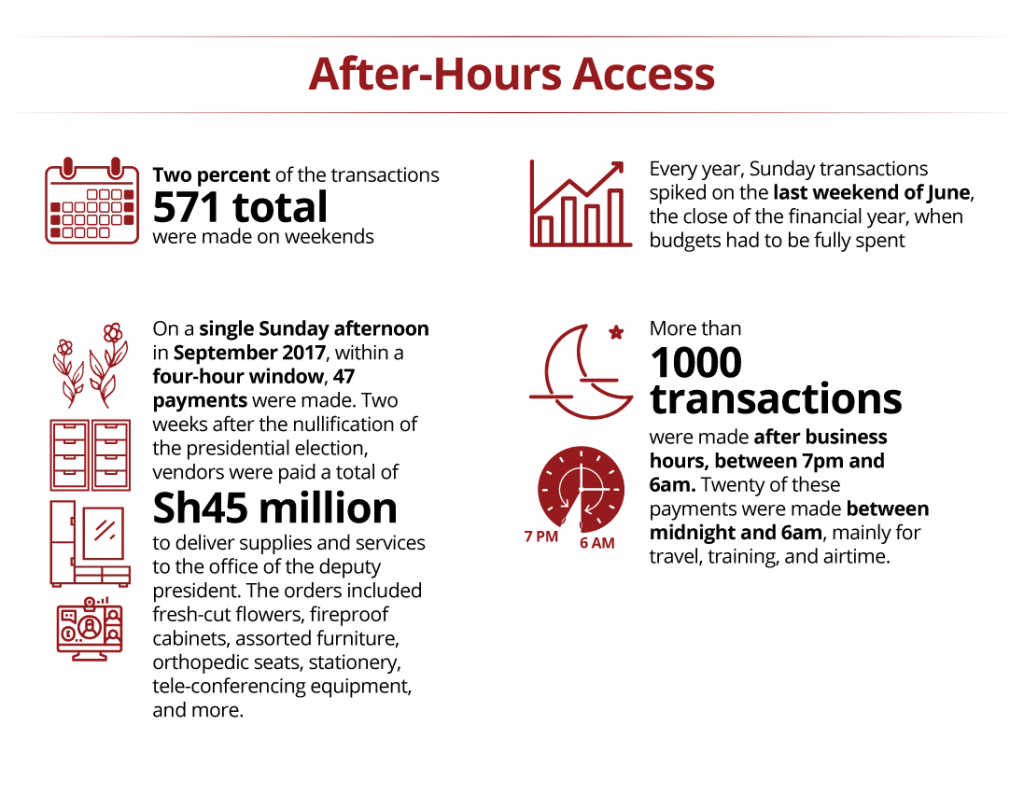
IFMIS was promoted as a solution for a faster procurement process and more transparent management of public funds. But the way the system was installed and used in Kenya compromised its extolled safeguards, according to auditors.
“There is a human element in the system,” said Ouko. “So if the human element is also not working as expected then the system cannot be perfect.”
The former head of the internal audit unit at the health ministry, Bernard Muchere, confirmed in an interview that IFMIS can be manipulated.
Masking the Setup
Ms Mukeli, the co-owner of Tira Southshore and Ameken Minewest, is the niece of Mrs Nyamai, according to local sources and social media investigation, although she denied the relationship to reporters. According to her LinkedIn profile, Ms Mukeli works at Kenya Medical Supplies Agency, a medical logistics agency under the Ministry of Health, now embroiled in a COVID procurement scandal.
Ms Mukeli’s mother, who is the MP’s elder sister, co-owns Icpher Consultants Company Ltd., which shares a post office box with Tira Southshore and Mematira Holdings Limited, which was opened in 2018, is co-owned by Mrs Nyamai’s husband and daughter, and is currently the majority shareholder of Ameken Minewest. Documents also show that a company called Icpher Consultants was originally registered to the MP, who was listed as the beneficial owner.
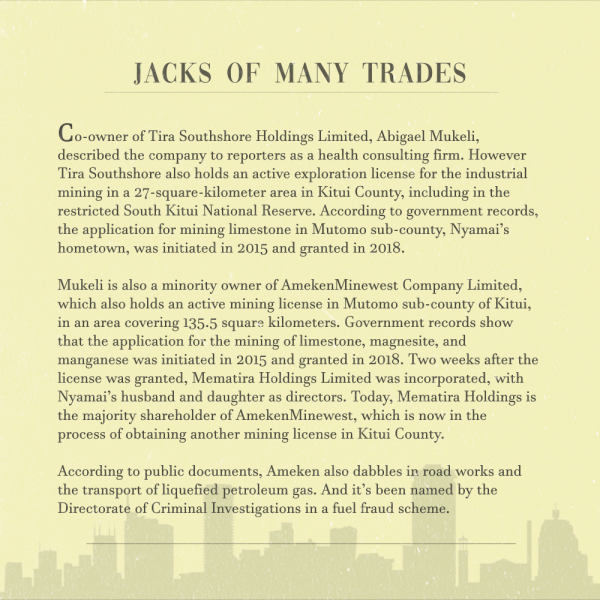
Yet another company, Wet Blue Proprietors Logistics Ltd., shares a phone number with Tira Southshore and another post office box with Icpher Consultants Company Ltd., according to a Kenya National Highway Authority list of pre-qualified vendors.
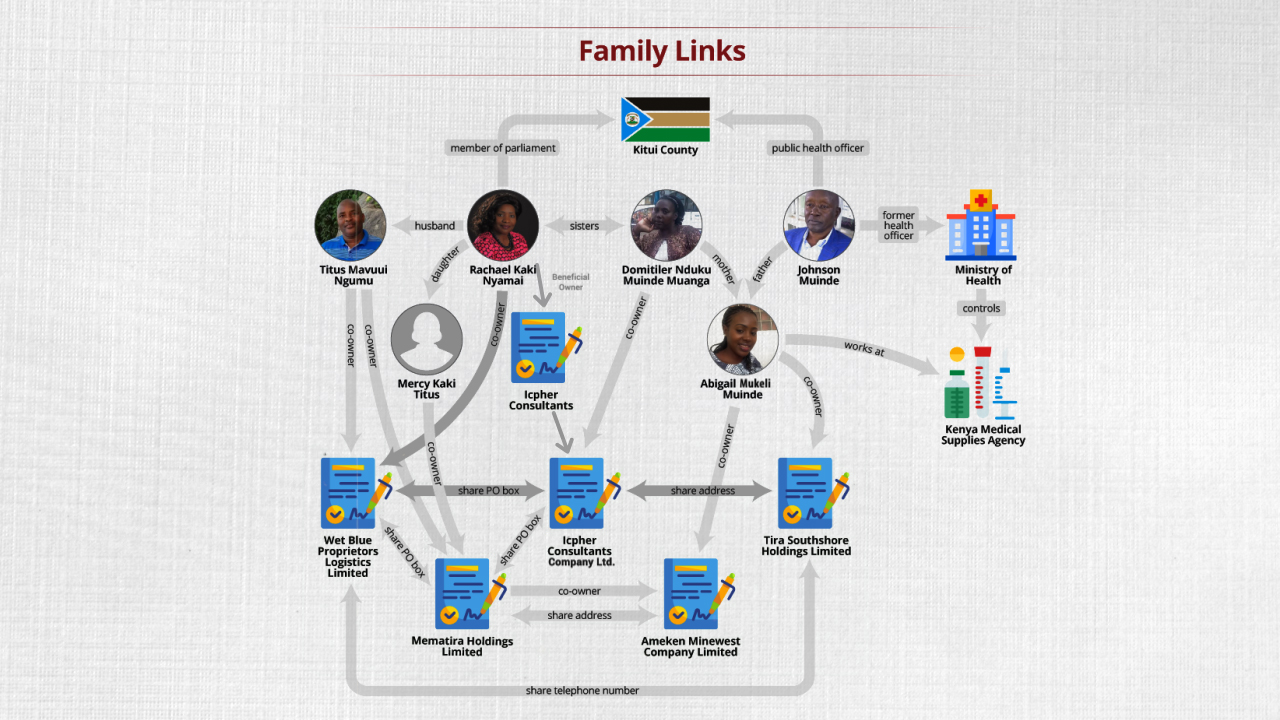
Mrs Nyamai and her husband co-own Wet Blue. The consulting company was opened in 2010, the same year that the lawmaker completed her PhD work in HIV/AIDS education in Denmark.
Wet Blue was licenced in 2014 as a dam contractor and supplier of water, sewerage, irrigation and electromechanical works. It’s also listed by KENHA as a vetted consultant for HIV/AIDS mitigation services, together with Icpher Consultants.
It is unclear why these companies are qualified to deliver all these services simultaneously.
“Shell companies receiving contracts in the public sector in Kenya have enabled corruption, fraud and tax evasion in the country. They are literally special purpose vehicles to conduct ‘heists’ and with no track record to deliver the public goods, works or services procured,” said Sheila Masinde, executive director of Transparency International-Kenya.
Both MOH and Ms Mukeli refused to confirm whether the ordered supplies were delivered.
Mrs Nyamai also co-owns Ameken Petroleum Limited together with Alfred Agoi Masadia and Allan Sila Kithome.
Mr Agoi is an ANC Party MP for Sabatia Constituency in Vihiga County, and was on the same Health Committee as Mrs Nyamai, a Jubilee Party legislator. Mr Sila is a philanthropist who is campaigning for the Kitui County senate seat in the 2022 election.
Juliet Atellah at The Elephant and Finance Uncovered in the UK contributed reporting.
Featured image: Svetlana Tiourina





Add comment